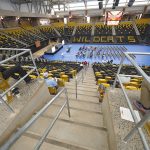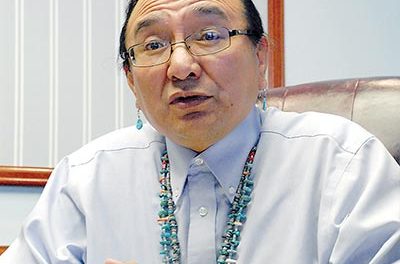
$6.6M in donation fund unspent, investigation called for
WINDOW ROCK
In May of 2020, the Navajo Nation COVID-19 Relief Fund was established to help the Nation respond to the pandemic and “to address immediate medical and community needs.”
It is the Nation’s only official COVID-19 fundraising effort.
As of Sept. 30, $2.7 million has been raised for the fund through online donations, $5.7 million through checks and wires, and $2 million through the Nation’s GoFundMe account set up by the Navajo Department of Justice, for a total of $10.4 million.
However, on Oct. 13, Council delegates were surprised to learn that over a year later, only a total of $1.97 million has been expended from the donation fund, with an additional $265,896 encumbered, leaving a remaining budget of $6.65 million unspent.
“It’s just a shame that this money was there to assist,” said Delegate Eugenia Charles-Newton. “People gave willingly, and that wasn’t done.
“In my opinion, the entire amount that was donated should have gone to the people,” she said. “This is unacceptable and I think an investigation needs to be launched.”
Controller’s office Accounting Manager Robert Willie reported that so far $49,086 had been spent on “repairs and maintenance,” $1.9 million on “contractual services,” and $13,998 on “assistance,” but no breakdown of what those exact expenses were was provided to the Naabik’iyati’ Committee.
“Who received those contracts, what were they for and who was it delivered to?” asked Charles-Newton. “Was it actually put out there for bidding or something done internally?
“When we’re looking at assistance, what type of assistance was offered?” she asked. “Was it monetary assistance to families? If it was, how were those families selected?”
Charles-Newton expressed concern over the lack of detail in the high-level expenditure summary and questioned the intent of the fund and whether or not the expectations of donors had been fulfilled.
“Were they led to believe that the entire donation that was being given to this account was going to go to the people?” she asked. “We are accountable to people who made these donations and we haven’t received any information.”
Delegate Raymond Smith, vice chair of the Budget and Finance Committee, said that the Navajo people still need help now to prepare for winter, including home repairs, indicating the unspent monies could be redirected.
“There’s a dire need with our Navajo people who were deeply impacted by COVID, especially individuals who lost their jobs, were sick, and are still struggling to get back on their feet,” said Delegate Nathanial Brown. “I know some of them are on the verge of facing evictions or foreclosures. With these donations, it should go to our Navajo people who are suffering right now.”
The Department of Emergency Management manages and administers the donation fund and developed a Fund Management Plan approved by the Budget and Finance Committee on Dec. 1, 2020.
However, no one from DEM was present at the Naabik’iyati’ meeting to provide more details about the expenditures and why more funds have not been spent.
According to the FMP, donations are to be expended only for the Nation’s COVID-19 relief efforts as prioritized by DEM, including preparedness, emergency response, recovery and mitigation of COVID-19 effects, emergency alerts, public service announcements and the needs of any Navajo Nation “government entity” relating to COVID-19.
Delegate Jimmy Yellowhair requested a full accounting of all of the donations that were made to the fund as well as a detail of all of the expenses.
“It’s really a shame that Council has to ask for a report on where the people’s money has gone,” said Charles-Newton. “When word gets out that this is how these funds were used, I really believe that we are going to be sued, not by one person, but by many people.”
‘A big need’
In January 2021, an expenditure plan for $8.9 million from the donation fund to support humanitarian aid distribution to chapters and sustain the ongoing Navajo Department of Health COVID-19 response was approved by B&F.
Included in the plan, DOH was to extend the operation of its Chinle Alternate Care Site and hotel isolation/quarantine sites across Navajo, continue contact tracing, and support was to be provided for the Division of Community Development distributions of food, water, PPE, and sanitation supplies with professional trucking and delivery support.
At the time, Delegate Carl Slater, vice chairman of the Health, Education and Human Services Committee, who sponsored the bill, indicated that the funds were being used according to the stated intent of the donation fund.
“I think that a lot of folks donating want to defer to the Nation as to how to spend the money as long as it’s being used to combat COVID-19 and addressing the conditions we’re experiencing right now,” he told the B&F in January.
Per the resolution, the COVID-19 Response Donation Fund budget allocations included the following contracts:
- $650,000 for use of Chinle Alternative Care Site/isolation facilities.
- $500,000 for epidemiology services.
- $1.5 million to extend a contract with PAE Applied Technologies and other vendors to operate the ACS and hotel isolation and quarantine facilities with patient care wrap-around services through July 2021.
- $525,000 for COPE Health Solutions contact tracing.
- $1.1 million for Navajo Engineering and Construction Authority trucking and chapter supply distribution services.
- $3.7 million for additional DEM food, water, wood, supplies and PPE for humanitarian aid to Navajo communities.
- $250,000 DEM transportation and delivery equipment.
Approved expenses included:
- $44,795 for travel expenses, including meals, lodging, and gas mileages for DOH staff.
- $49,086 for DEM emergency Mass Notification System software.
- $323,718 for diesel fuel for humanitarian aid deliveries.
- $1,500 for waste disposal.
It was noted that 2021 donations would be allocated at a later date.
Jill Jim, director of DOH, said continuing the isolation and quarantine service to separate COVID-19 patients from their families was critical and “wrap-around services,” including medical staff, lab services, security, catering, laundry, janitorial and patient transport services, were required to support the sites.
“We need to make sure these isolation sites stay in place so we don’t overwhelm our health care system,” said Slater. “They are incredibly important in terms of mitigating the spread within our multi-generational households.”
Jim explained that DOH did not have any additional funds to draw from to support the COVID-19 response services for the Nation.
“The donation funding will help us continue to respond to some of the gaps that we have,” said Jim. “There is a big need.”
DCD Director Pearl Yellowman told B&F that the $28 million in bulk supplies for chapters that were ordered through the CARES Fund Chapter Distribution Plan needed to be distributed and the contract with NECA would allow semi-trucks with certified drivers to safely make deliveries to the chapters.
“The massive amount of goods from these purchases is about 9,100 pallets which equates to 400 truckloads that need to be delivered throughout the Nation,” she said.
Why more of the contracts were not fulfilled or monies spent is currently unknown.
DEM Director Harland Cleveland did not respond to a request for explanation from Navajo Times by press time.
The B&F resolution also includes a provision for the Navajo government to seek reimbursement for some of the eligible allocations of the donation fund from FEMA or other federal funds, but there is no word on whether or not that has been set in motion yet.
“I ask at this time that we launch an investigation to find out where this funding went, where the supplies went, how many people were assisted in this process,” Charles-Newton said. “I think this is very important and not something that we should just push under the rug. This is part of being accountable to the Navajo people.”
Charles-Newton recommended an independent investigation of the donation funds to include the Department of Emergency Management, Navajo Department of Health, the COVID-19 Health Command Operations Center, Division of Community Development, Department of Justice and the president’s office.
Speaker Damon said he would work with the Office of Legislative Counsel to look into the matter and seek their advice about next steps.
Information: www.navajo.fund
As a public service, the Navajo Times is making all coverage of the coronavirus pandemic fully available on its website. Please support the Times by subscribing.
How to protect yourself and others.
Why masks work. Which masks are best.
Resources for coronavirus assistance







 Highway 264,
Highway 264, I-40, WB @ Winslow
I-40, WB @ Winslow